Dealing with a reactive Chihuahua can be pretty tough. These little guys can be a handful, getting all worked up and making you wonder what to do next.
It helps to understand why they act this way and what sets them off. That way, you can be more patient and use positive vibes to train them.
Keep an eye out for when your Chihuahua starts to get reactive. Knowing these signs helps a lot in creating a calm space and guiding your dog the right way.
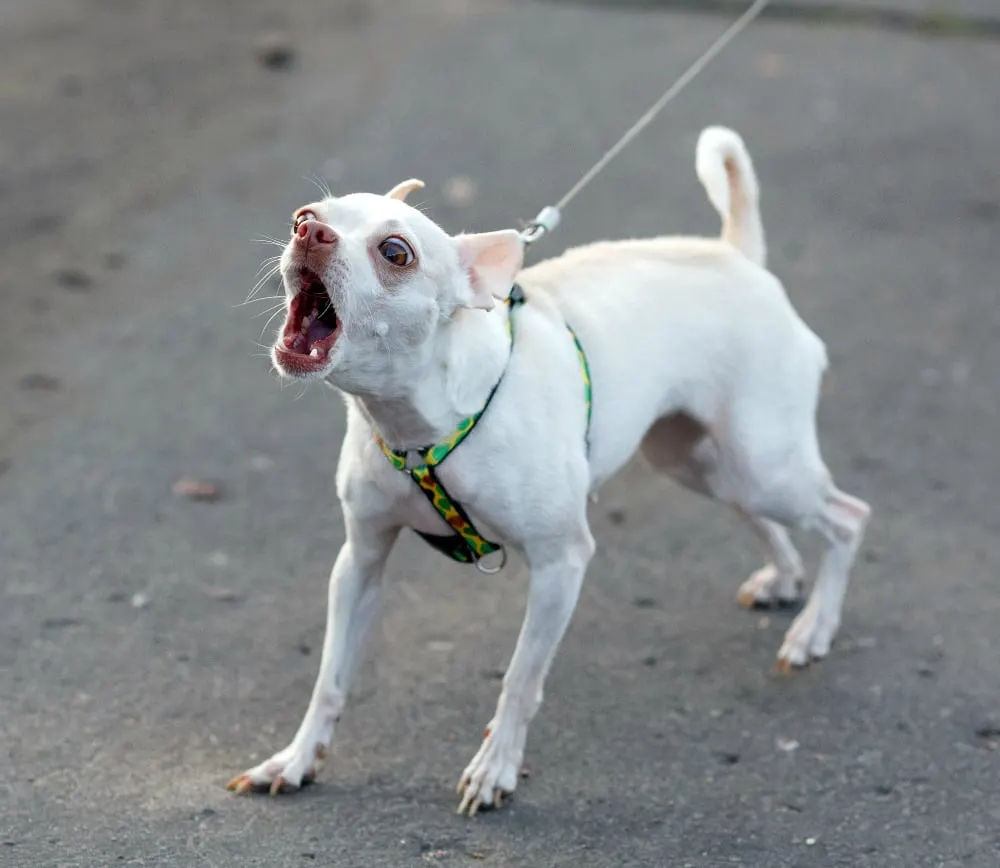
Sure, Chihuahuas are tiny, but they can react big time! They might get all agitated when they bump into other dogs or people, hear loud noises, or find themselves in a new spot. When they’re reactive, they might bark like crazy, lunge, growl, or even snap.
But remember, just because they’re reactive doesn’t mean they’re always aggressive. Reactive dogs, like Chihuahuas, often overdo their reactions to certain things, usually out of fear or stress.
The good news is, with the right training, understanding, and support, you can help your little Chihuahua get through these tough moments. This means a happier, more relaxed life for both of you!
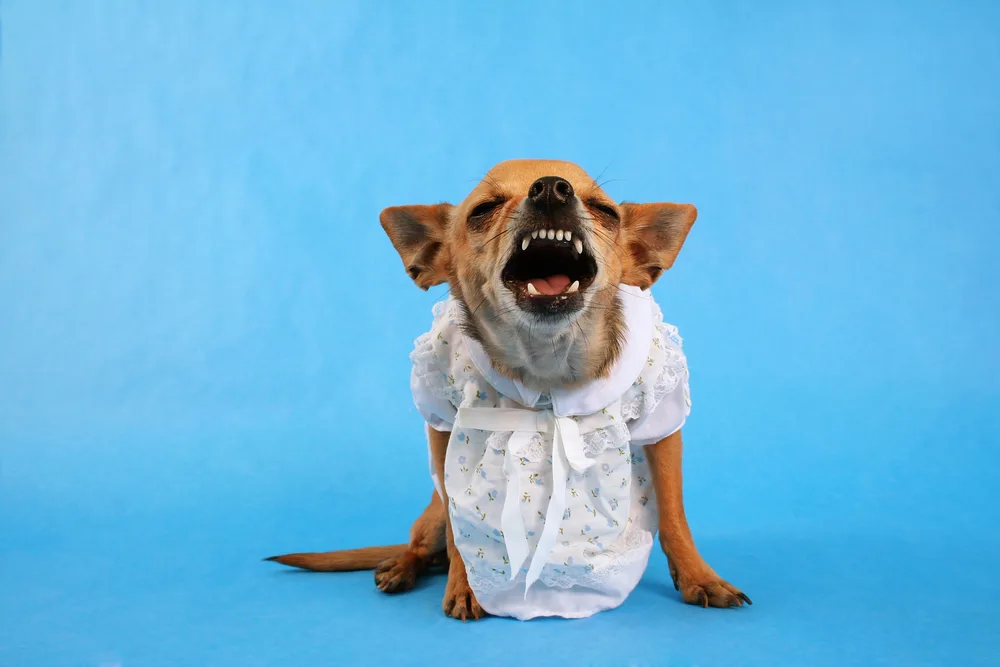
Understanding Reactivity in Chihuahuas
So, if you’ve got a Chihuahua, you might have noticed they can get a bit extra sometimes.
Here’s the thing: this isn’t always them trying to be the boss of other dogs. More often than not, your little buddy is actually feeling scared, stressed out, or anxious in some situations.
Just a heads up, it’s not about them being aggressive, it’s more about them reacting to what’s going on around them.
Why Your Chihuahua Might Be Acting Out
So, let’s break down why your Chihuahua might be getting all jumpy and reactive:
- Genetics: Some Chihuahuas are just naturally more on edge or nervous because of their genetics. It’s a good idea to dig into their breed background to get the full picture of their personality.
- Lack of socialization: If your little buddy hasn’t hung out much with other dogs, they could become scared or anxious around them. It’s super important to let them meet different dogs and check out new places while they’re still young.
- Insufficient training: If your Chihuahua doesn’t know how to deal with certain things around them, they might react in unexpected ways. Regular, calm training sessions can teach them how to keep their cool and handle new or tough situations.
- Fear and anxiety: Some Chihuahuas are more prone to feeling scared or anxious, and this can make them react more. Figuring out what freaks them out and working through it can help calm them down over time.
The main thing is to work with your Chihuahua to help them relax. Remember, when they’re reactive, it’s not about being mean or aggressive – it’s more like they’re having a hard time dealing with stress or anxiety.
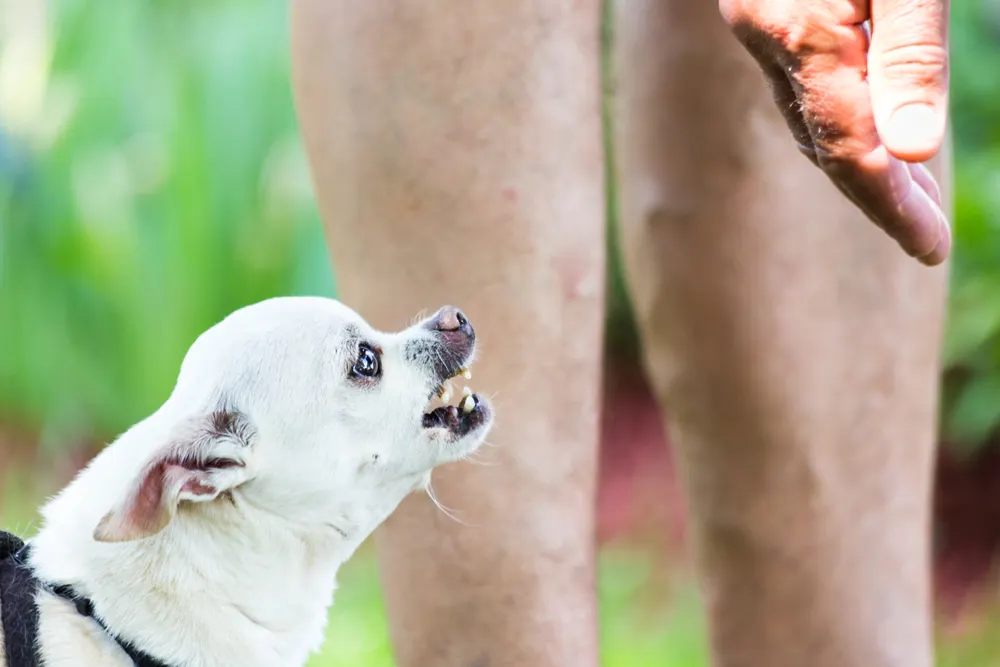
Figuring Out What Sets Off Your Chihuahua
Things Around Them That Might Spook Them
Your Chihuahua might get all worked up over things like loud bangs or booming thunder. Keep an eye on how they act when stuff like this happens to see if they get scared.
Also, things moving quickly, like bikes, cars, or even other critters, can startle them. Being on the lookout for these things can help you get ready to calm your Chihuahua down when they get spooked.
Social Triggers
When it comes to other animals or people they don’t know, your Chihuahua might get anxious or scared, leading them to act out.
When you’re out for a walk, watch how they’re feeling and the scene around them. You might need to give them some space from whatever’s bothering them. Noticing how they react in different social spots can clue you in on what to expect and help you handle their reactions better in the long run.
Just remember, keeping cool and going with the flow helps a ton in working with your Chihuahua to get past these jumpy moments.
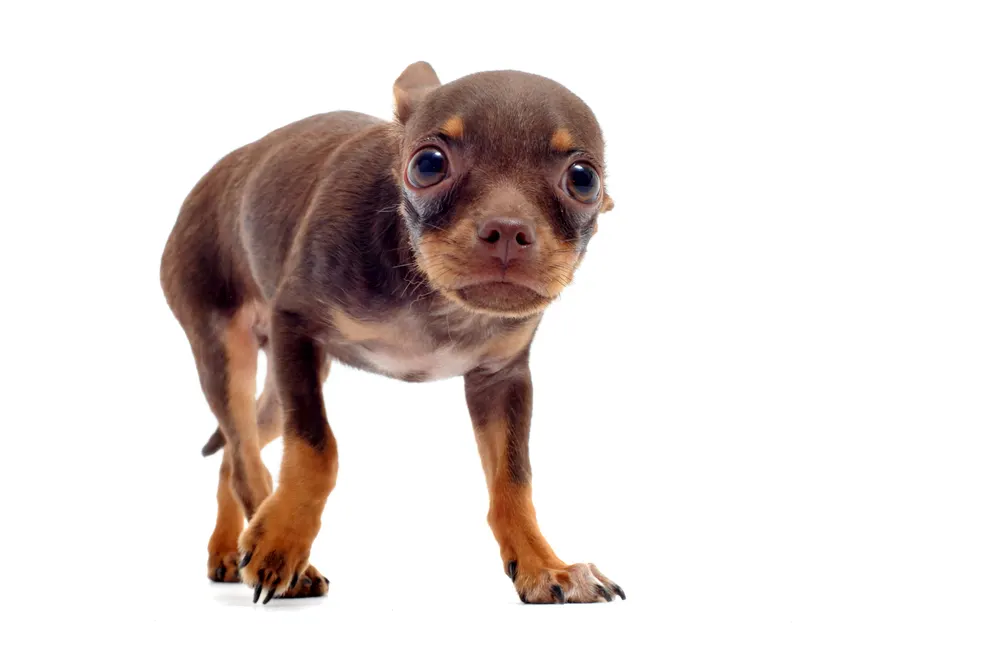
Signs of Reactivity in Chihuahuas
Just like any dog, Chihuahuas can get reactive. If you’re a Chihuahua parent, it’s good to know the signs so you can understand and help your furry buddy.
First up, if your Chihuahua is barking a lot, that might be a clue. They could be barking their head off because they’re annoyed or scared. Notice how loud and intense their bark is – a reactive bark is usually way louder and more intense than just a regular bark.
Growling is another heads-up that your Chihuahua might be feeling off. When they growl, they’re basically saying they’re not cool with something. Remember, don’t get mad at them for growling – it’s their way of letting you know what’s up.
If your Chihuahua starts lunging at other pets or people, it’s a sign they might be scared or nervous. Keep an eye out for this when you’re out and about or hanging with others.
Nipping or snapping is another thing they might do if they’re feeling defensive. If you see your Chihuahua nipping at people or other animals, it’s time to figure out why they’re feeling this way and sort it out before it turns into a bigger problem.
Also, watch their body language. Things like their fur standing up, getting all stiff, pinning their ears back, or tucking their tail are signs your Chihuahua is stressed or feeling threatened.
In short, knowing these signs can really help you make things better for your Chihuahua and keep everyone around them calm and safe.
Tips for Training Reactive Chihuahuas
Training a reactive Chihuahua can be a bit of a challenge, but with some patience, consistency, and a kind approach, you’ll do great. Here are some chill tips to help your training sessions go smoothly.
Positive Reinforcement Methods
Instead of getting upset or punishing your Chihuahua when they act out, try cheering them on for the good things they do. This means rewarding them when they behave well or react nicely to things. Here’s how you can do it:
- Treats: Who doesn’t love treats, right? Give your Chihuahua some yummy treats when they do something good.
- Praise: A little “Good dog!” goes a long way. Praise your Chihuahua when they listen or stay calm.
- Toys: Use their favorite toys during training. It makes learning fun and encourages them to keep up the good behavior.
Sticking to this positive approach helps your Chihuahua learn to manage themselves better and feel less stressed. It’s all about making them feel good for doing the right thing!
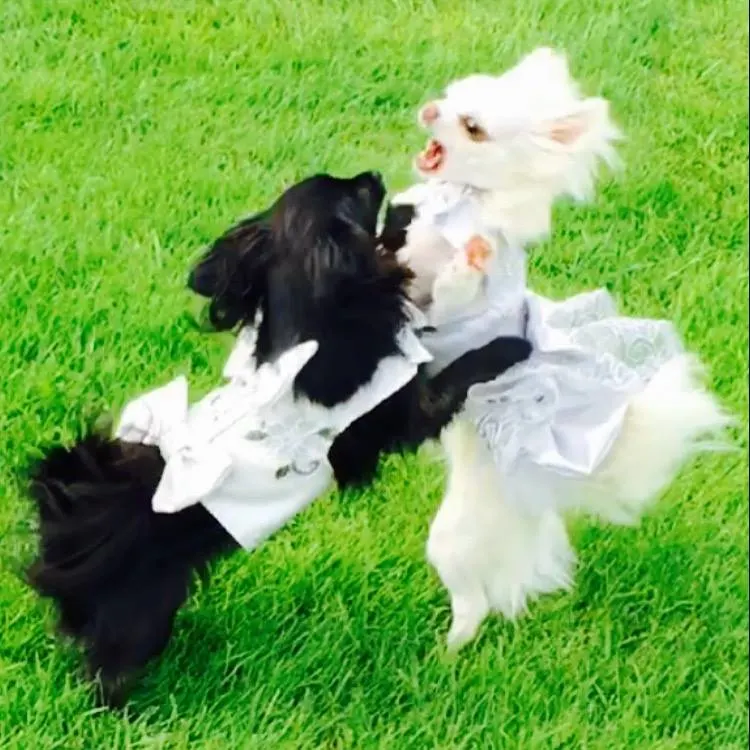
Socializing Your Reactive Chihuahua
Getting your reactive Chihuahua to be cool with new people, other dogs, and different places is a big deal. Here’s how to make it a positive vibe for them:
- Gradual Exposure: Don’t just throw your Chihuahua into new situations. Start slow, letting them check out other dogs or new people from a safe spot, then get closer as they chill out.
- Puppy Playdates: If you’ve got a puppy Chihuahua, set up some playdates with other friendly pups or calm older dogs. It’s a great way for them to learn how to play nice.
- Positive Associations: Whenever they’re facing something new, break out the treats, give them some praise, or bring out their favorite toy. It makes new experiences fun instead of scary.
- Chill and Steady Wins the Race: Don’t rush things. If you push too hard, your Chihuahua might freak out more.
Calming Down a Scared Chihuahua
If your Chihuahua is reacting because they’re scared, here’s how to help them get brave:
- Desensitization: Gradually get them used to whatever scares them. Start small and work up, always pairing it with treats or playtime.
- Obedience Training: Teaching basic commands like “sit,” “stay,” and “leave it” can help give your Chihuahua a sense of control and predictability in potentially “scary” situations. This may reduce their fear and anxiety.
- Managing Triggers: Figure out what freaks them out and either help them get used to it or avoid it when you can.
By following these tips and using a positive, casual approach during your training sessions, you’ll be well on your way to helping your reactive Chihuahua become a more confident, well-adjusted pet.
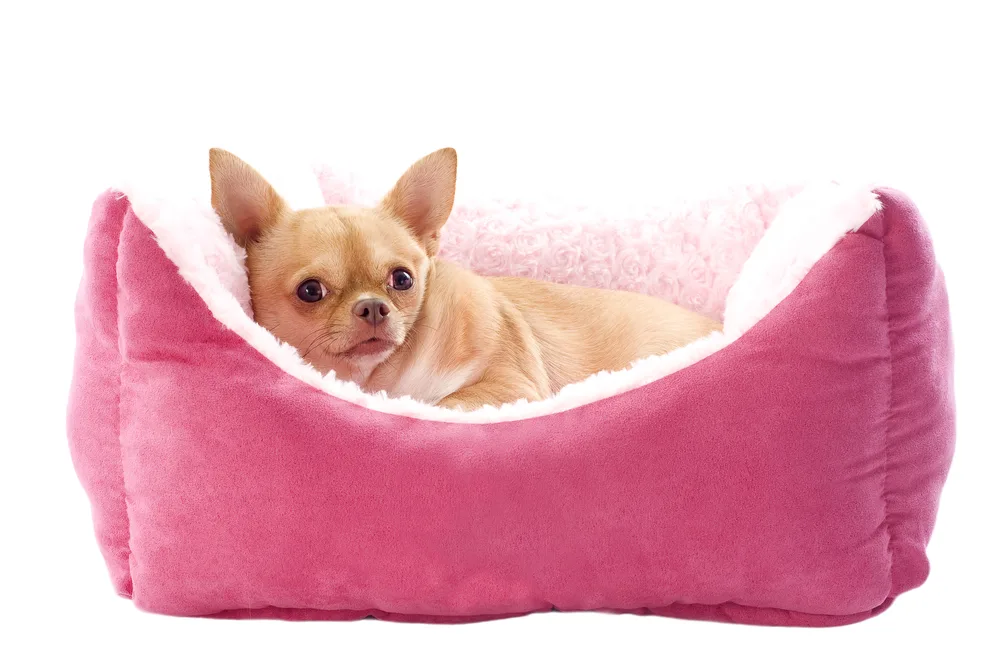
Providing a Supportive Environment
Taking care of a nervous Chihuahua can be a handful, but making a cozy space for them helps a lot. Here’s what to do:
- Think About Their Needs: Chihuahuas, especially the young ones, need a spot to play and get rid of energy. Make sure they have a space where they can do their thing.
- Slow and Steady: Don’t rush them into new stuff. Introduce new things slowly and use treats and praise to make it a good time.
- Cozy Corner: Set up a quiet, comfy spot for them to rest. It’s their safe place to relax and get away from stress.
- Watch for Stressors: Keep an eye on what sets them off, like loud noises or strangers, and try to keep those to a minimum.
Medical Interventions
Wondering if there’s a medical fix for your reactive Chihuahua? Here’s what you can do:
- Vet Check: Sometimes, being reactive is because they’re in pain or not feeling great. Your vet can check if there’s something up and maybe suggest meds for pain or discomfort.
- Chill Pills?: In some cases, your vet might recommend meds to help calm their nerves. But always chat with your vet first to see if it’s a good idea.
- Healthy Lifestyle: Regular vet visits, good food, and staying active are key. Also, make sure they’re not getting bored – keep their brains busy!
Challenges and Solutions for Reactive Chihuahua Owners
Small Dog Syndrome
If your Chihuahua thinks they’re a big deal because they’re small, here’s how to help:
- Early Socializing: Get them used to different places, people, and animals early on. It’ll help them feel more confident and less scared.
- Leash Lessons: If your Chihuahua gets edgy on walks, learn what bugs them and work on getting them used to it. Keep treats handy for calm moments, and use things like trees or cars as buffers.
- Kids and Critters: Chihuahuas might be nervous around kids or other pets. Introduce them slowly and always watch what’s happening. Teach kids to be gentle and give your Chihuahua space.
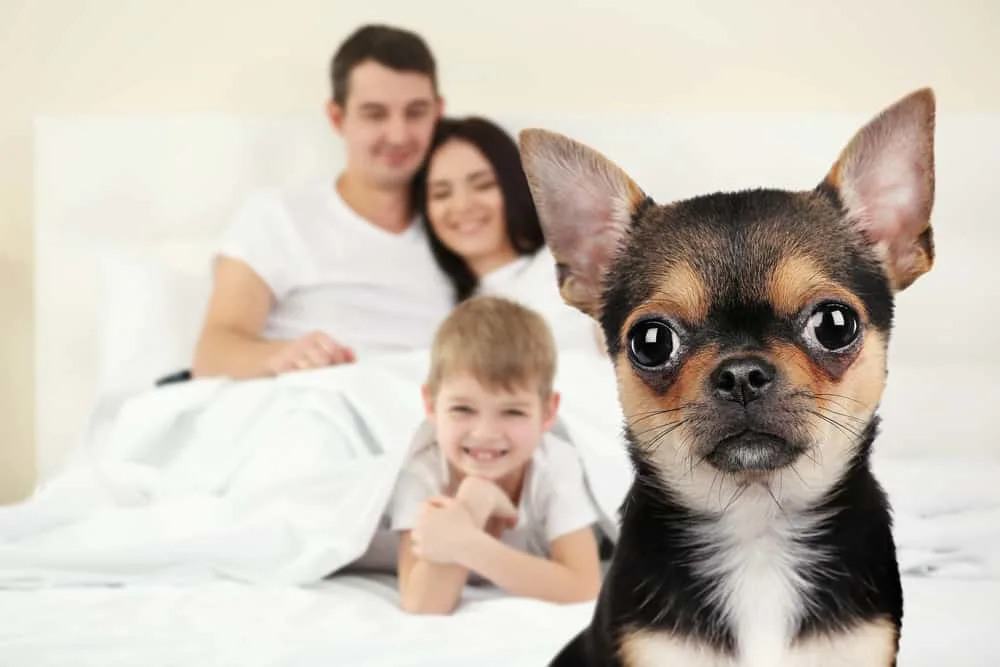
Transitioning Reactive Chihuahuas to New Homes
Adopting a Reactive Chihuahua
Bringing a reactive Chihuahua into your home? Here’s how to make it work:
- Take It Slow: Give them time to get comfy in their new digs. Set up a safe spot for them to retreat to when they need a break.
- Social Skills: Gradually get them used to new people and dogs. Use treats and praise to make it a good experience.
- Training Time: Don’t expect overnight miracles. Stick with your training plan and be patient.
- Call in the Pros: If things are tough, a dog trainer or behaviorist can really help out.
Every Chihuahua is different, so some might take longer to adjust. Just be patient and consistent, and you’ll help your Chihuahua become the happy, well-adjusted buddy you want them to be.
I’d love to hear your tips in what helped you train your reactive chihuahua so leave us a comment and let us know. It may help another reader who needs guidance.

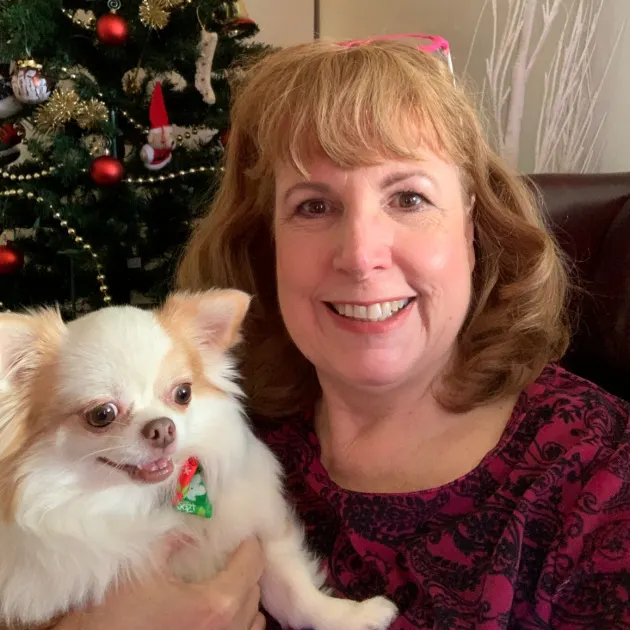
Cathy Bendzunas
Pet Blogger

Susan
Sunday 7th of September 2025
My very sweet Chihuahua in private has turned into a reactive dog. He has a huge personality. He’s a love to me but at the wrong moment he can forget it’s me. My question is if I live in an apartment complex with dogs…and he literally starts getting edging smelling a dog and barks like a monster if he sees one….even if across two parking lots. He has playmates & plays well. But outside he freaks. He pulls out of his harness. I’ve bought about 20 of them, the one he has now works the best but 2 sec of ignoring and he’ll pull out. He was getting feisty with people but I’ve gradually starting introducing him again. He’s been sweet to the last two people and likes a friend that he’s known for a while. If I’m holding him and there is a dog outside sometimes I could stop him but try to be prepared. I thinks he’s being defensive. Protective? I can’t do anything but walk back inside while he explodes. He definitely has separation anxiety so I’m sure it interferes in ways that I don’t realize. I adore my pup but it’s a challenge. About a year ago a dog did try to get him and actually bit my hand but he was safe. That dog is gone. I’d appreciate any thoughts. The vet gave me trazadone and suggested an antidepressant if he doesn’t improve. I hate the idea of drugging him. He’s always been feisty and the vet used to require trazadone prior to visits. He’s good at the vet until he sees a dog. I have to get him out and away asap!! Thanks for suggestions!
Cathy Bendzunas
Sunday 7th of September 2025
It sounds like you need a consultation with a dog behaviorist. they know how to deal with cases like this. Look it up on google in your area and see if there are any available. it's worth a try before medicating him.